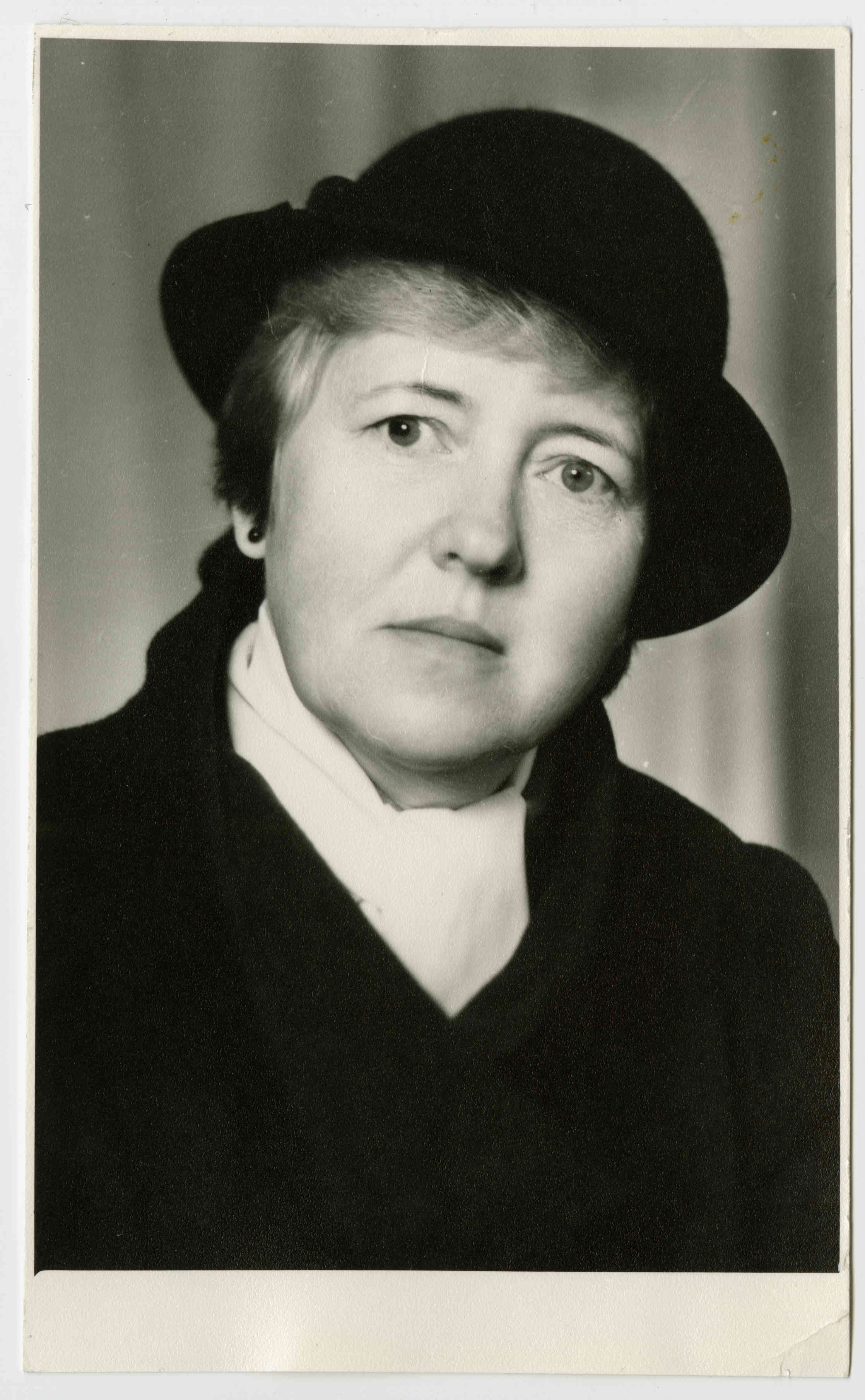
Virve Osila
Virve Osila (until 1967 Virve Reest, 10 November 1946 – 7 August 2025) was a poet and playwright.
Osila was born in Kohtla-Järve in Ida-Virumaa County as the daughter of a miner. Until 1961, she attended Mäetaguse 7-year School, from 1961–1962, Tapa Secondary School No. 1, and from 1963–1967 studied nursing by distance learning at Tartu Medical School. In the 1960s–1970s, Osila worked as a nurse and kindergarten teacher at several places in Ida-Virumaa County and in the surroundings of Haapsalu. In 1981, she was hit by a heart attack and lost the ability to work. Later, she lived at Mäetaguse village in Ida-Virumaa County and contributed to the local press.
Osila made her debut with the poem Valge toomingas (‘White Bird Cherry Tree’) in the children’s newspaper Säde in 1957. Throughout decades, her poetry was published in several Estonian local newspapers. From 1990 to the end of its publication in 1995, Osila’s poems appeared in the exile Estonian magazine Triinu.
Virve Osila published more than 20 poetry collections, a collection of plays and a collection of articles, Teretused (‘Salutations’, 1998). She wrote 16 plays for grown-ups, also some plays for children. The book Elu on teater (‘Life is Theatre’) contains ten plays written in 1983–2008. The plays were meant for amateur theatre groups in villages, and they have been played successfully across Estonia. The play Kiitus kosjakontorile (‘Praise to the Matchmaker’s Office’) was performed by the Estonian theatre group of Thirlmere, Australia, in 1994. Osila’s plays are realistic and true to life. The author stated that she had copied her stories from life, combining the doings and sayings of several persons into one character. Osila’s plays are also suitable for reading as stories. They provide an overview of Estonian village life in the final decades of the 20th century and the first years of the 21st century.
Osila said that her poetry is an outcome of her mental states, as many of her poetry collections were inspired by difficult experiences or events. Her emotional love and nature poetry is popular in Estonia. Osila wrote about the home and homeland, childhood memories and love, nature and human feelings. Although her creation sometimes expresses a tint of sorrow, it is still hopeful and optimistic. Virve Osila called herself a child of nature and believer in stones. Her favourite places were graveyards and forests; her favourite tree was the rowan. The poet was happy about what is beautiful, but she was also critical of the society and referred to sore points in life. Most of Osila’s poems are in traditional verse with a simple rhyming scheme, but she also wrote sonnets and free verse. Virve Osila’s lyrical poetry does not tend to philosophy. The sincerity, logic and comprehensibility of her mode of expression make Osila’s poetry enjoyable to many. A lot of her poems have been set to music (among others, by Urmas Alender, a classic of Estonian rock) and translated into Russian and German.
L. P. (Translated by I. A.)
Books in Estonian
Poetry
Mälestuste tuul. Viljandi: Perioodika, 1990. 54 lk.
Valgus valusvaikselt väreleb. Kohtla-Järve: Põhjarannik, 1990. 64 lk.
Südameaed: kolmas kogu luuletusi. Kohtla-Järve: Põhjarannik, 1993. 80 lk.
Lootuse luiged. Viljandi: Ajaleht Sakala, 1994. 64 lk.
Hingelind. Viljandi: V. Osila, 1995. 23 lk. [Luuletused Urmas Alenderi mälestuseks.]
Kodulaulud. Kohtla-Järve: V. Osila, 1996. 16 lk.
Liblikatiibade tuhk: Läänemaalt leitud laulud: 1966–1971. Haapsalu: Anamnesia, 1996. 54 lk.
Peotäis päikeseõisi. Kohtla-Järve: V. Osila, 1996. 93 lk.
Tundelaulud. Kohtla-Järve: V. Osila, 1996. 8 lk.
Lastelaulud. Kohtla-Järve: V. Osila, 1997. 16 lk.
Elan oma väikest elu. Jõhvi: V. Osila, 1998. 75 lk.
Aeg enne Linnuteed. Jõhvi: V. Osila, 1999. 104 lk.
Mõtteharjutuste vihik: elukooli 53. kursus: 1999/2000. õ-a. Mäetaguse: V. Osila, 2000. 25 lk.
Nägemused. Jõhvi: V. Osila, 2000. 32 lk.
Köögilaulud. Jõhvi: V. Osila, 2001. 44 lk.
Pühendused. I. Jõhvi: V. Osila, 2001. 40 lk.
5-aastakud. Eesti: V. Osila, 2001. 16 lk.
Eelõhtused. Jõhvi: V. Osila, 2002. 84 lk.
Pühendused II. Jõhvi: V. Osila, 2002. 36 lk.
Elu & aeg. Eluaeg. Jõhvi: V. Osila, 2004. 136 lk.
Varjus. Mäetaguse: V. Osila, 2006. 95 lk.
Maa ja taeva vahel. Mäetaguse: V. Osila, 2008. 112 lk.
Läbi enese: valik elu-, olu-, mälu-, ilu- ja valupildikesi. Mäetaguse: V. Osila, 2009.
131 lk.
Hajameelsus. Mäetaguse: V. Osila, 2010. 72 lk.
Terad ja sõklad. Mäetaguse: V. Osila, 2012. 78 lk.
Paigalrändaja. Mäetaguse: V. Osila, 2014. 80 lk.
Siit nurgast ja sealt nurgast… Mäetaguse: V. Osila, 2018. 119 lk.
Süda peopesal: valitud luuletused 1966–2014. / I osa. Mäetaguse; Jõhvi: PR Põhjarannik, 2016. 499 lk.
Süda peopesal: valitud luuletused 1966–2014. / II osa. Mäetaguse; Jõhvi: PR Põhjarannik, 2016. 466 lk.
Noppeid: luuletused, mõtisklused, elupildid, arvamused, sahtlisalmid. Loomingulise materjali kogus kokku Tiina Tõnurist. Mäetaguse: V. Osila, 2022. 136 lk.
Noppeid. Luuletused, mõtisklused, elupildid, arvamused. Vol. 2. Loomingulise materjali kogus kokku Tiina Tõnurist. Mäetaguse: Virve Osila, 2023, 136 lk.
Plays
Elu on teater: kogutud näidendid. Mäetaguse; Jõhvi: PR Põhjarannik, 2018. 572 lk.
Elu on teater: kogutud näidendid. 2. Mäetaguse: V. Osila, 2024, 255 lk.
Essays and articles
Teretused. Jõhvi: Ü. A. Võsar, 1998. 231 lk. [Artiklid.]
Nii ma arvasin: arvamuslood 1997–2019. Mäetaguse: V. Osila, 2019.
335 lk.
Noppeid: luuletused, mõtisklused, elupildid, arvamused, sahtlisalmid. Loomingulise materjali kogus kokku Tiina Tõnurist. Mäetaguse: V. Osila, 2022. 136 lk.
Noppeid. Luuletused, mõtisklused, elupildid, arvamused. Vol. 2. Loomingulise materjali kogus kokku Tiina Tõnurist. Mäetaguse: Virve Osila, 2023, 136 lk.



